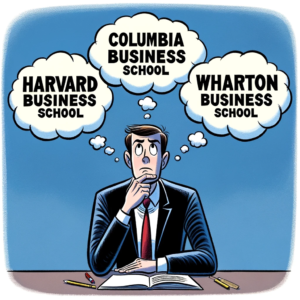
At Gurufi, we help hundreds of applicants each year get into their dream schools. One problem we repeatedly encounter is applicants being worried what their bosses will think about them applying for an MBA. Indeed, the decision to apply for an MBA can trigger a swirl of emotions, especially when it comes to discussing your plans with your employer. You might be feeling an odd mix of excitement about the next steps in your career and apprehension about how your current boss will react, particularly if you’ve recently been promoted. Rest assured, this is a common dilemma faced by many MBA applicants, and there are tactful ways to approach the situation.
Firstly, it’s essential to remember that applying for an MBA is a significant professional development step, not a sign of ingratitude or disloyalty. As you talk to your boss, keep this frame in mind and use it to inform your tone and thoughts. Even if you have recently been promoted, your pursuit of an MBA demonstrates your ambition and drive to further contribute to your organization or industry in the future.
It’s also worth noting that your boss, like any other professional, likely understands the importance of continuous growth and learning. If they have been supportive and instrumental in your career development thus far, chances are, they will be supportive of your decision to pursue an MBA as well. Remember, a recommendation from your boss can significantly strengthen your application, so it’s worth having an open and honest conversation with them about your, especially if you intend to return to the company upon earning your MBA.
Before you talk to your boss, have a clear idea about why you want to pursue an MBA. Being able to explain your motivations will not only help convince your boss that this is the right step for you, but also shows that you’ve thought seriously about this decision. The reasons can vary widely, from wanting to deepen your business acumen to intending to switch industries or roles, but the crucial thing is that your motivations align with your overall career trajectory.
When discussing your decision, focus on the positive outcomes an MBA could bring to your current organization. For instance, emphasize how the skills and knowledge you gain could benefit your team or department. You could even propose a way to stay connected with your current organization while pursuing your MBA, if this is a possibility and something you’d be interested in.
Timing is also crucial in such conversations. Consider your boss’s schedule and choose a time when they aren’t rushed or stressed. It’s best to schedule a dedicated meeting for this discussion rather than bringing it up casually or in a meeting with a different focus.
As for the conversation itself, honesty is the best policy. Start by expressing your gratitude for the opportunities and support you’ve received so far, including the recent promotion. Explain that you’re discussing this with them because you value their opinion and would appreciate their support.
Then, outline your reasons for wanting to pursue an MBA, ensuring to tie them back to your professional growth and how this could potentially benefit the organization. It’s essential to convey that this decision is about your long-term career development and isn’t reflective of any dissatisfaction with your current role or company.
When it comes to requesting a letter of recommendation, be straightforward and respectful. Acknowledge that it’s a significant request and assure them that you understand if they need some time to think it over. If they agree, make it as easy as possible for them by providing a summary of key points that they might include in the letter.
But what if you aren’t intending to return to the company or are looking to transition into a new industry?
When preparing to discuss your departure for an MBA with your boss, approach the conversation with professionalism and transparency. Begin by scheduling a private meeting, ensuring an environment conducive to a respectful and focused discussion. Start by expressing gratitude for the opportunities and experiences gained at the company, acknowledging how they’ve contributed to your professional growth and decision to pursue further education.
Clearly communicate your intention to pursue an MBA to transition into a new industry or company. Be honest about your career aspirations, emphasizing that this decision aligns with your long-term professional goals. It’s important to be clear that your path forward involves moving on from the company, but do so respectfully, highlighting your positive experiences.
Offer to provide a smooth transition, including training a replacement or documenting your responsibilities. This demonstrates responsibility and respect for the company’s needs. Be prepared to discuss the timing of your departure, aiming for a mutually agreeable timeline.
Finally, maintain a tone of gratitude and professionalism throughout the conversation. Your goal is to leave on good terms, preserving professional relationships and networks for the future
Remember, while you might feel nervous about this conversation, it’s a normal part of the MBA application process. Most bosses will respond positively to your ambition and drive, and will want to support you in your next career step. Even if they express concerns or disappointment about your potential departure, maintaining open and respectful communication can help ease the transition for both parties.
It’s normal to feel apprehensive about discussing your MBA plans with your boss, especially if you’ve recently received a promotion. However, by approaching the conversation with honesty, tact, and a clear vision of your future career goals, you can not only gain their understanding but potentially their support and a powerful letter of recommendation as well.
For more help with your personal statement, check us out at Gurufi.com. Our personal statement editors and consultants have decades of experience helping clients get into top MBA programs. Our specialty is helping you craft compelling personal statements that move the needle in your admissions process! For questions, shoot us an email at service@gurufi.com. Check us out on Facebook, Twitter, and LinkedIn.






